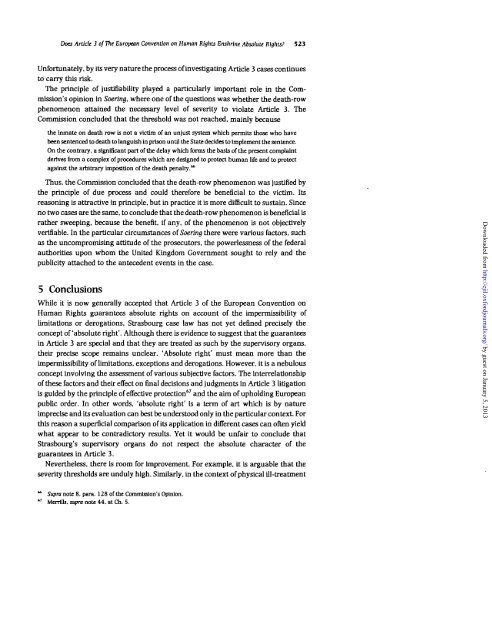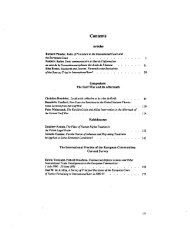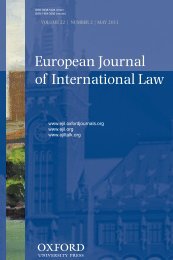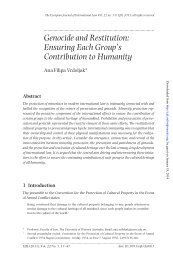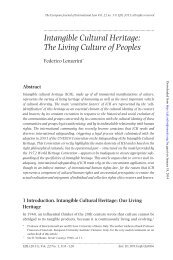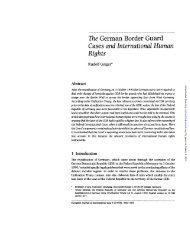Does Article 3 of The European Convention on Human Rights ...
Does Article 3 of The European Convention on Human Rights ...
Does Article 3 of The European Convention on Human Rights ...
You also want an ePaper? Increase the reach of your titles
YUMPU automatically turns print PDFs into web optimized ePapers that Google loves.
<str<strong>on</strong>g>Does</str<strong>on</strong>g> <str<strong>on</strong>g>Article</str<strong>on</strong>g> 3 <str<strong>on</strong>g>of</str<strong>on</strong>g> <str<strong>on</strong>g>The</str<strong>on</strong>g> <str<strong>on</strong>g>European</str<strong>on</strong>g> <str<strong>on</strong>g>C<strong>on</strong>venti<strong>on</strong></str<strong>on</strong>g> <strong>on</strong> <strong>Human</strong> <strong>Rights</strong> Enshrine Absolute <strong>Rights</strong>? 523<br />
Unfortunately, by its very nature the process <str<strong>on</strong>g>of</str<strong>on</strong>g> investigating <str<strong>on</strong>g>Article</str<strong>on</strong>g> 3 cases c<strong>on</strong>tinues<br />
to carry this risk.<br />
<str<strong>on</strong>g>The</str<strong>on</strong>g> principle <str<strong>on</strong>g>of</str<strong>on</strong>g> justifiability played a particularly important role in the Commissi<strong>on</strong>'s<br />
opini<strong>on</strong> in Soering, where <strong>on</strong>e <str<strong>on</strong>g>of</str<strong>on</strong>g> the questi<strong>on</strong>s was whether the death-row<br />
phenomen<strong>on</strong> attained the necessary level <str<strong>on</strong>g>of</str<strong>on</strong>g> severity to violate <str<strong>on</strong>g>Article</str<strong>on</strong>g> 3. <str<strong>on</strong>g>The</str<strong>on</strong>g><br />
Commissi<strong>on</strong> c<strong>on</strong>cluded that the threshold was not reached, mainly because<br />
the Inmate <strong>on</strong> death row is not a victim <str<strong>on</strong>g>of</str<strong>on</strong>g> an unjust system which permits those who have<br />
been sentenced to death to languish in pris<strong>on</strong> until the State decides to Implement the sentence.<br />
On the c<strong>on</strong>trary, a significant part <str<strong>on</strong>g>of</str<strong>on</strong>g> the delay which forms the basis <str<strong>on</strong>g>of</str<strong>on</strong>g> the present complaint<br />
derives from a complex <str<strong>on</strong>g>of</str<strong>on</strong>g> procedures which are designed to protect human life and to protect<br />
against the arbitrary Impositi<strong>on</strong> <str<strong>on</strong>g>of</str<strong>on</strong>g> the death penalty. 66<br />
Thus, the Commissi<strong>on</strong> c<strong>on</strong>cluded that the death-row phenomen<strong>on</strong> was justified by<br />
the principle <str<strong>on</strong>g>of</str<strong>on</strong>g> due process and could therefore be beneficial to the victim. Its<br />
reas<strong>on</strong>ing is attractive in principle, but in practice it is more difficult to sustain. Since<br />
no two cases are the same, to c<strong>on</strong>clude that the death-row phenomen<strong>on</strong> is beneficial is<br />
rather sweeping, because the benefit, if any, <str<strong>on</strong>g>of</str<strong>on</strong>g> the phenomen<strong>on</strong> is not objectively<br />
verifiable. In the particular circumstances <str<strong>on</strong>g>of</str<strong>on</strong>g> Soering there were various factors, such<br />
as the uncompromising attitude <str<strong>on</strong>g>of</str<strong>on</strong>g> the prosecutors, the powerlessness <str<strong>on</strong>g>of</str<strong>on</strong>g> the federal<br />
authorities up<strong>on</strong> whom the United Kingdom Government sought to rely and the<br />
publicity attached to the antecedent events in the case.<br />
5 C<strong>on</strong>clusi<strong>on</strong>s<br />
While it is now generally accepted that <str<strong>on</strong>g>Article</str<strong>on</strong>g> 3 <str<strong>on</strong>g>of</str<strong>on</strong>g> the <str<strong>on</strong>g>European</str<strong>on</strong>g> <str<strong>on</strong>g>C<strong>on</strong>venti<strong>on</strong></str<strong>on</strong>g> <strong>on</strong><br />
<strong>Human</strong> <strong>Rights</strong> guarantees absolute rights <strong>on</strong> account <str<strong>on</strong>g>of</str<strong>on</strong>g> the impermissibility <str<strong>on</strong>g>of</str<strong>on</strong>g><br />
limitati<strong>on</strong>s or derogati<strong>on</strong>s, Strasbourg case law has not yet defined precisely the<br />
c<strong>on</strong>cept <str<strong>on</strong>g>of</str<strong>on</strong>g> 'absolute right'. Although there is evidence to suggest that the guarantees<br />
in <str<strong>on</strong>g>Article</str<strong>on</strong>g> 3 are special and that they are treated as such by the supervisory organs,<br />
their precise scope remains unclear. 'Absolute right' must mean more than the<br />
impermissibility <str<strong>on</strong>g>of</str<strong>on</strong>g> limitati<strong>on</strong>s, excepti<strong>on</strong>s and derogati<strong>on</strong>s. However, it is a nebulous<br />
c<strong>on</strong>cept involving the assessment <str<strong>on</strong>g>of</str<strong>on</strong>g> various subjective factors. <str<strong>on</strong>g>The</str<strong>on</strong>g> interrelati<strong>on</strong>ship<br />
<str<strong>on</strong>g>of</str<strong>on</strong>g> these factors and their effect <strong>on</strong> final decisi<strong>on</strong>s and judgments in <str<strong>on</strong>g>Article</str<strong>on</strong>g> 3 litigati<strong>on</strong><br />
is guided by the principle <str<strong>on</strong>g>of</str<strong>on</strong>g> effective protecti<strong>on</strong> 67 and the aim <str<strong>on</strong>g>of</str<strong>on</strong>g> upholding <str<strong>on</strong>g>European</str<strong>on</strong>g><br />
public order. In other words, 'absolute right' Is a term <str<strong>on</strong>g>of</str<strong>on</strong>g> art which is by nature<br />
imprecise and its evaluati<strong>on</strong> can best be understood <strong>on</strong>ly in the particular c<strong>on</strong>text For<br />
this reas<strong>on</strong> a superficial comparis<strong>on</strong> <str<strong>on</strong>g>of</str<strong>on</strong>g> its applicati<strong>on</strong> in different cases can <str<strong>on</strong>g>of</str<strong>on</strong>g>ten yield<br />
what appear to be c<strong>on</strong>tradictory results. Yet it would be unfair to c<strong>on</strong>clude that<br />
Strasbourg's supervisory organs do not respect the absolute character <str<strong>on</strong>g>of</str<strong>on</strong>g> the<br />
guarantees In <str<strong>on</strong>g>Article</str<strong>on</strong>g> 3.<br />
Nevertheless, there is room for Improvement For example, it is arguable that the<br />
severity thresholds are unduly high. Similarly, in the c<strong>on</strong>text <str<strong>on</strong>g>of</str<strong>on</strong>g> physical ill-treatment<br />
** Supra note 8. para. 128 <str<strong>on</strong>g>of</str<strong>on</strong>g> the Commissi<strong>on</strong>'s Opini<strong>on</strong>.<br />
' 7 Merrills, supra note 44. at Ch. 5.<br />
Downloaded from<br />
http://ejil.oxfordjournals.org/<br />
by guest <strong>on</strong> January 5, 2013


